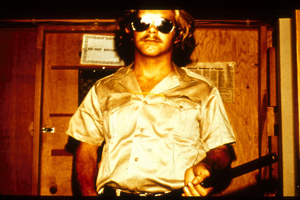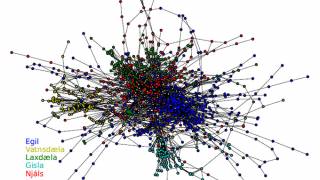You’re As Evil as Your Social Network: What the Prison Experiment Got Wrong
Source: motherboard.vice.com

In 1961, psychologist Stanley Milgram began an experiment that left humanity with one of the most dismal and damning self-portraits we’ve ever seen. It seemed to demonstrate that the overwhelming majority of regular Americans are willing to administer a lethal electric shock to a human victim when prompted to do so by an authority figure.
A decade later, Milgram’s fellow psychologist and former high school classmate Philip Zimbardo performed another experiment at Stanford University that captured on tape the transformation of regular college students into authoritarian monsters. In a matter of days, those playing the role of guards had the prisoners going mad in solitary confinement and defecating in buckets in their cells. Zimbardo shut the experiment down half way through, but only after his fellow psychologist and future wife appealed to his sense of humanity.
The experiments were part of a greater intellectual reaction to the 1962 trial of Adolph Eichmann - the Nazi bureaucrat generally regarded as the man who signed off on the holocaust. An explanation was sought, but as far as outward appearances, Eichmann was no blood-hungry ogre. He was an average looking, middle-aged pencil pusher with thinning hair. In her classic account of the Eichmann trial, "Eichmann in Jerusalem," Hannah Arendt summed up the Nazi obersturmbannfuhrer’s life and death thus: "Except for an extraordinary diligence in looking out for his personal advancement, he had no motives at all." He was "just following orders."
To Arendt, this was "the banality of evil," the apparently mechanical process of obedience--whereby an otherwise uninteresting person can become an agent of extraordinary cruelty. In a system like Nazi Germany, where social acceptance was the reward for evil, the socially normal individual sees evil as good. Doing evil becomes nothing more than healthy self-interest, and the horrifying irony is that the person committing unimaginable cruelty comes across in other social contexts as a perfectly "normal," uninteresting individual, no more conspicuous than the rumpled businessman sitting next to you on the train.
The body of psychological research around the banality of evil painted a pretty awful picture of humanity. "The System" was turning regular folks into monsters. In his book "Obedience to Authority," Milgram quoted George Orwell:
"As I write, highly civilized human beings are flying overhead, trying to kill me. They do not feel any enmity against me as an individual, nor I against them. They are only “doing their duty,” as the saying goes. Most of them, I have no doubt, are kind-hearted law abiding men who would never dream of committing murder in private life. On the other hand, if one of them succeeds in blowing me to pieces with a well- placed bomb, he will never sleep any the worse for it."
In Milgram’s own words: "The essence of obedience consists in the fact that a person comes to view himself as the instrument for carrying out another person’s wishes, and he therefore no longer regards himself as responsible for his actions."
But the theory about obedience and comformity wasn’t quite complete. Fast forward to 2002, when the BBC produced a 5-episode series blending reality TV with social psychology research. By no means scientifically conclusive, "The Experiment," as the show was called, did serve to illustrate some of the shortcomings in the famous Stanford prisoner experiment and the widely accepted banality of evil theory.
At the helm of "The Experiment" were two psychologists who have worked for over a decade challenging classical models of obedience: Alex Haslam, currently Professor of Psychology at the University of Queensland, and Steven Reicher, head of the School of Psychology at the University of St. Andrews. Both focus on the role of social and group identity in determining how people behave.
Their research suggests that there is no passive "Lucifer Effect" leading people simply to do what they are told. In a recent paper, Professeors Haslam and Reicher summarize some of the conclusions being drawn from the past fifteen years of research. What they have found is that blind obedience is not the norm. The study concludes:
"At root, the fundamental point is that tyranny does not flourish because perpetrators are helpless and ignorant of their actions. It flourishes because they actively identify with those who promote vicious acts as virtuous. It is this conviction that steels participants to do their dirty work and that makes them work energetically and creatively to ensure its success. Moreover, this work is something for which they actively wish to be held accountable—so long as it secures the approbation of those in power."
These findings point to the inner, conscious agency of those carrying out the vicious agendas of evil regimes. People are never just black-box agents taking inputs from authority figures and producing outputs in the form of obedient execution of commands. People are responsible for their own ideas, and it is through their own personal identification with a given social order that they become agents of good or evil. Belief matters, and any resistance to authoritarian control depends ultimately on the strength of the opinions in the minds of individuals.
[...]
Read the full article at: motherboard.vice.com






















